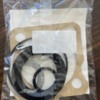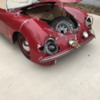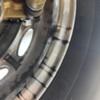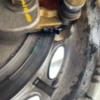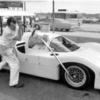I recently bought a new build 356 Speedster. Got it 8 months ago. Having issues with leaking both rear axel seals. Have swing axels. Want to buy high quality seal kit not cheap China knockoffs which failed. Are there any German made products anyone knows of? Links?
not sure why having issues on 900 mile vehicle. 1915cc. Pic of kit I was given by builder but label conveniently peeled off.  Thanks
Thanks
Replies sorted oldest to newest
Sure.
Bugcity.com has them. Search for 311598051 It comes as a kit for about $12 per side. You don't need the "S" version with the spacer.
Several people on here have had good luck in replacing rear swing arm axle seals, like @DannyP and @Al Gallo and they may have other parts sources. They can be tricky to install right.
Order the German seals. I used the Chinese crap twice unsuccessfully. It's a messy job at best. You have to clean and dry the area like you're going to eat off it. I used a thin smear of Hi-temp silicone on all parts and re-assembled very carefully. If you pinch anything it will fail. When you refill the axle tubes and wait a while you will see if you did it right.
Some people say that you don't need the silicone. It worked for me .
As we say, your mileage may vary. This is why we say ,"welcome to the madness".
I had an issue with a leaking axle seal and it turned out the axle nut hadn't been torqued to the right spec. Have you checked to make sure both sides have been torqued to the proper spec? It is a new car and that may be a possibility.
Excellent point , Robert! While you're at it you might want to order German axle boots, because if you keep the car for a few years you will probably need those too.
Thank you everyone for your responses. It’s been very frustrating.
hope to hear more.
Don't be too downhearted.
As you can see, we've ALL been through something like this.
Do you have a Bentley VW Service manual for Type 1 (Sedan) around 1970?
All the info you'll need to service the drive train will be in there.
Was getting pretty frustrated.
Not huge leak but see gear oil dripping on inside tire. Was very concerned how long I could go like this.
thanks so much for input.
I was having the same trouble installing the seals on my swing axle and developed a system which worked well for me. First buy the best German parts that you can and then study the assembly diagram very carefully. Everything that could be put into the outer carrier that could be was done first. Then only what was absolutely could not be put in the carrier got put onto the axle part. That way, the minimum number of 0 rings etc. that had to get rolled over other parts was already in it's final resting place without rolling over other parts and creating a damaged or jambed 0 ring. It's hard to describe but lay the parts out in order of assembly and study the diagram. It was a while ago for me so I'm going by memory here.
This note from sunny St.Augustine, Fl with no snow....
Thanks so much!
Im just down the road a bit in Cocoa.
We're going to Sun n Fun after this and know Cocoa well...hope to be there for a few days after. Fishlips too along with the Sand Bar. We'll ping you when there.
I use absolutely ZERO of the modern shmutz/silicone/sealer on the gaskets. I install everything clean and bone dry. I've never had one leak.
Of course, I also check all parts and surfaces for smoothness and CLEAN the crap out of them.
Honestly, it's not that hard. I've even used the Chinese kits and been successful. Follow the Bentley diagram.
One thing to remember: the "spacer" that comes with the kits is made from cheap tin or something. It WILL smoosh when torqued, leaving your axle nut LOOSE in short order. Throw the new "spacer" away and re-use the OE and ancient hardened VW one.
And no matter what anyone says, torque to AT LEAST 250 ft. lbs. The factory 217 setting is simply not enough. There have been miles of posts on this exact subject so do a search...
@Dennis Connaughton - Do you have rear disks or drums? If the latter, you probably have oil on the braking surfaces, with is a bad thing. Ask me how I know.
My brakes felt fine until called on in an emergency situation. Turns out all I had were front brakes due to an oil leak like yours. Since the front has much less weight on it, they locked up, the car kept going, and this happened. Even if you have disks, make sure there is no oil on the rotors.
The preceding was a public safety announcement. We now return to our regularly scheduled programming.
Attachments
I have disc breaks but I do see oil on them and tire below. it is very worrisome that’s why I am trying to rectify issue quickly and limit driving. Thanks so much and Sorry for your accident.
Wolfsberg West also has a nice German kit. I use them and Bug City. The "good" seals are blue and the o-rings are a bit thicker.
***HOWEVER*** One of the largest causes for leaks in a swingaxle with 4 wheel discs is aftermarket caliper brackets. These parts are all designed to smash down at a particular thickness, which is the thickness of the cap mounting plate in the drum brake backing plate. There are different types of caliper brackets that take the place of the drum backing plate and both the stamped or forged brackets vary in thickness from each other, and even from batch to batch. The proper way to install, which almost no-one does, is install the bearing cap without the bracket and measure the gap from the cap to the flange, then measure the thickness of the caliper bracket. This will tell you how many shims (aka paper gaskets) are needed, or if you need to turn down your bearing caps on a lathe so they can seat properly. We find a TON of caliper brackets too thick and in need of turning down a cap for proper fit.
There was a time when they were made with consistency and would just bolt up, but not for several years. Sometimes we get lucky but more often we make the proper fit.
@Dennis Connaughton, are you sure it's oil and not hydraulic fluid from a leaky caliper? You're probably right, but the caliper would be an easier fix.
Attachments
@chines1 posted:Wolfsberg West also has a nice German kit. I use them and Bug City. The "good" seals are blue and the o-rings are a bit thicker.
***HOWEVER*** One of the largest causes for leaks in a swingaxle with 4 wheel discs is aftermarket caliper brackets. These parts are all designed to smash down at a particular thickness, which is the thickness of the cap mounting plate in the drum brake backing plate. There are different types of caliper brackets that take the place of the drum backing plate and both the stamped or forged brackets vary in thickness from each other, and even from batch to batch. The proper way to install, which almost no-one does, is install the bearing cap without the bracket and measure the gap from the cap to the flange, then measure the thickness of the caliper bracket. This will tell you how many shims (aka paper gaskets) are needed, or if you need to turn down your bearing caps on a lathe so they can seat properly. We find a TON of caliper brackets too thick and in need of turning down a cap for proper fit.
There was a time when they were made with consistency and would just bolt up, but not for several years. Sometimes we get lucky but more often we make the proper fit.
Thanks so much. Great information.
I have a great idea: IRS.
I wish I would have had IRS done as part of my build. Oh well. Probably cost ridiculous amount to install now.
Carey's post made me really glad I have IRS.
@Michael McKelvey posted:Carey's post made me really glad I have IRS.
Yeah, me too. All I could think was, "Wow - those poor Spyder guys"
@Stan Galat posted:Yeah, me too. All I could think was, "Wow - those poor Spyder guys"
Don’t feel bad for me Stan, my Spyder is going to be IRS! 
I have been through this, replacement of the swing axle seals, and it is not a glamorous operation unless you like that sweet smell of 90wt gear lube in the morning. I did this once, after noticing that my rear drum brake shoes were wiped out by the axile seals leaking on both sides.
It was somewhat of a learning process, as I was not sure what year the swing axle setup was in my Vintage Speedster (that used a 1970 IRS chassis). So there was a learning curve involved with a couple of trips to my local VW parts supplier to get the correct gaskets and parts.
Once done, as mentioned above, it's important to work as a surgeon making sure that all surfaces are squeaky clean before reassembly.
My car has been in storage since Covid 2020, so your topic puts another item to check on my list of things to inspect and expect when I break it out of storage to ensure that it is again road worthy.
I will say that after I did the repair it was very gratifying to see zero leaks afterward for more than 8 years of weekend driving.
I found a mechanic who is a Porsche and VW specialist. He actually is the East Coast warranty service rep for Intermeccanica. He repaired both my rear seals and after a month not a drop anywhere on clean cardboard sheets I place under my car. Keep my fingers crossed. Glad to hear you were able to fix your car. 👍
@Dennis Connaughton posted:I found a mechanic who is a Porsche and VW specialist. He actually is the East Coast warranty service rep for Intermeccanica. He repaired both my rear seals and after a month not a drop anywhere on clean cardboard sheets I place under my car. Keep my fingers crossed. Glad to hear you were able to fix your car. 👍
So who is this fellow and where is he located ?
You know, I've never found the rear axle seals to be a big deal. Make sure you have ALL the required parts and a new seal kit. I use the ones from Weddle, they are currently $9 each. Very important that things are clean and free of burrs and such especially the spacer that rides inside the oil seal. I use NO silicone/sealant/goo of any kind. I spray both sides of the seal retainer gasket with Copper gasket spray.
I've never had one leak that I've installed in over twenty years.
Carey is absolutely spot-on correct about the caliper brackets though. I have also had good luck using a belt sander to clean up the sealing surface on the bearing retainer.
Clean, smooth, free from burrs makes for no leaks.


